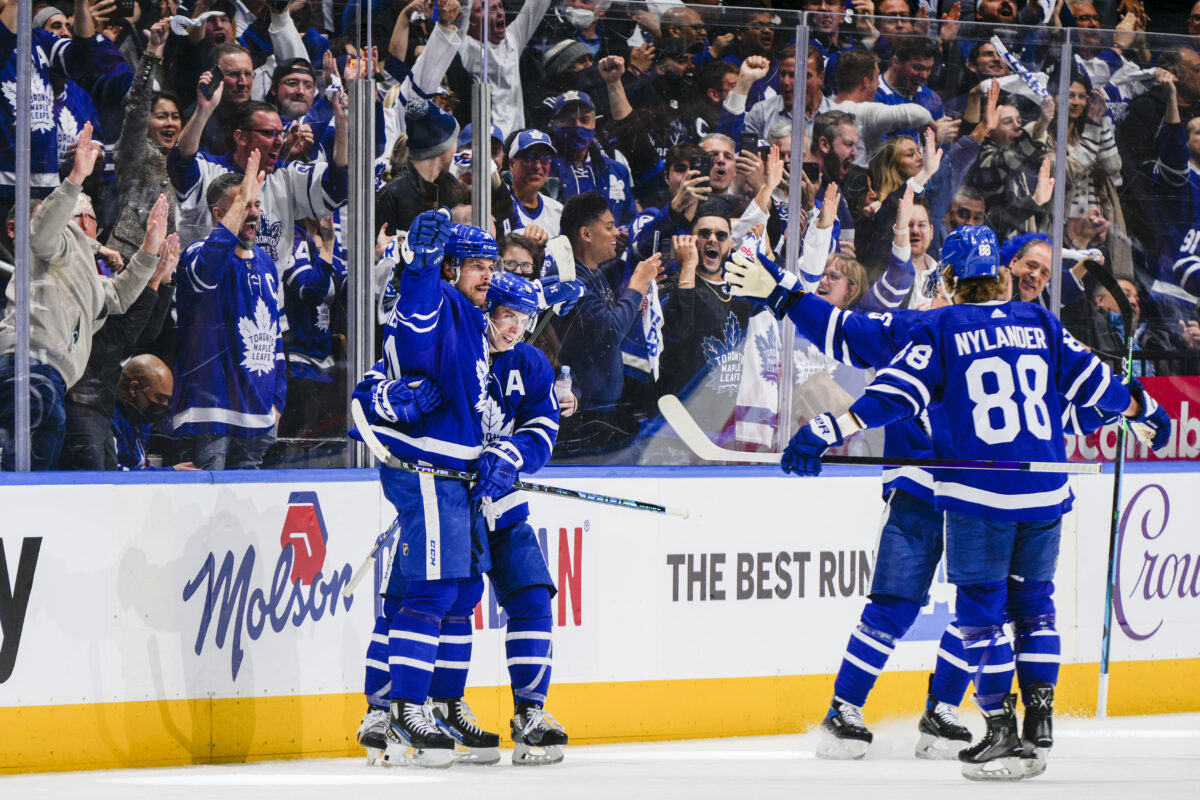In Friday’s Toronto Maple Leafs news conference featuring Auston Matthews and general manager (GM) Brad Treliving, several key revelations shed light on the contract negotiation process and Matthews’ role within the team. I believe these revelations provide fans with valuable insights into Matthews’ leadership, intelligence, and the dynamics behind his contract extension.
In this post, I’ll try to reveal what I believe the five key takeaways are and what they tell us about the two main characters – Matthews and Treliving – who took part in that conference.
Takeaway 1: Treliving Admitted that Matthews Ran the Show
During the media conference, Matthews explained that the four-year term felt right for both his comfort level and the team’s flexibility. When his turn came to answer questions, GM Treliving praised Matthews’ leadership and willingness to strike a balance in the contract negotiations. He emphasized the importance of finding a balance (the so-called “sweet spot”) between term and money in all players’ contracts, especially as they impacted salary cap constraints.
Treliving shared that Matthews has consistently expressed his commitment to the team and the city. As for the team’s future, Treliving reported that he was focused on improving the roster and noted his ongoing discussions with head coach Sheldon Keefe. He also affirmed his commitment to securing a new contract for William Nylander. His brief evaluation of Nylander during the conversation was that he was a “star.”
Takeaway 2: Treliving Believed Matthews Considered the Team
Perhaps I was reading too much into the context, but I had the feeling that Treliving had let out a huge breath when he realized that Matthews wasn’t going to squeeze him or take advantage of the team’s predicament.
Related: 4 Predictions for William Nylander’s 2023-24 Season
Treliving noted that, “The bottom line is…You are talking about one of the world’s best talents. In the situation he was in, he could come in and demand a whole lot more than what he got. That’s just the reality.”
Treliving also acknowledged, “It [the contract signing] gets done because Auston says he wants to get it done. I want it to be a non-issue. I want the focus to be where it needs to be and that’s on winning and putting all of our energies on the ice.”

Treliving summarized, “And that’s why it’s done. At the end of the day, it’s a sign of leadership. We could all want certain things but until the player wants to get it done and that’s why it gets done.”
Takeaway 3: Treliving Believes Matthews Is Really Intelligent
When he first came into the Maple Leafs GM role, Treliving made it his top priority to meet with Matthews in Arizona as a way to establish the relationship.

Treliving spoke about that process: “What I’ve really learned through this process, is how smart he [Matthews] is. He takes in a lot of information. He’s an independent thinker. He’s very cerebral.”
Treliving shared that, with Matthews, “It wasn’t just a process of trying to go down and hammer out a contract, it was giving him an overview. With me coming, where do I see the team? The things that we’d like to try to do. Get his thoughts.”
Related: Tim Horton: A Legacy of Hockey, Donuts, & Coffee
Treliving added, “But then, [we’d] just have some general conversations about life and get to know each other. That dovetails into the business side of working through a contract.”
In summarizing, it’s clear that Treliving thinks Matthews is an intelligent person. He learned a lot about the Arizona native from his interactions and conversations with him during the negotiation process. Treliving noted Matthews’ ability to absorb a significant amount of information, his independent thinking, and his cerebral approach to discussions.
Their discussions were reported to be “broad,” not only the contract, but also the team’s context and direction, as well as their personal lives. Treliving was impressed by Matthews’ capacity to engage in these discussions and provide valuable insights. I wonder if there are any “Now What?” conversations to have after this offseason. I’ll share one just below.
Takeaway 4: Matthews Could Make a Good Captain
Clearly, elements in Treliving’s comments suggest Matthews would be a good consideration for becoming the team’s captain. First, the idea that Matthews is an independent thinker matters. This quality suggests he has the ability for effective leadership because he’ll make decisions, take initiative, and think critically.
Second, Treliving mentioned Matthews’ cerebral approach. The ability to be cerebral implies Matthews has he capacity for strategic thinking, understanding the nuances of the game (and the business), and being able to make thoughtful decisions on and off the ice.
Related: Auston Matthews Poised to Rewrite Maple Leafs’ Scoring Records
Third, Treliving noted Matthews’ ability to engage in discussions. He highlighted that their conversations went beyond the contract negotiations and indicated that Matthews actively shared about the team’s direction and other “life” issues. A willingness to engage in such discussions is a trait often found in team leaders and captains.
My comments here don’t suggest that I believe Matthews should replace John Tavares as the team’s captain. But I am suggesting that I believe Treliving came away from the process believing that Matthews (a) balanced both his own and the team’s interests in the negotiations as well as (b) possessed the kinds of qualities commonly associated with effective leadership in a hockey team.
Takeaway 5: Five Foundational Ideas Emerged from the Media Conference
As I reviewed what I saw as the key insights from the media conference, I took away five foundational understandings I believe were embedded.
First, Auston Matthews is valuable to this franchise. Not only is he recognized as one of the world’s best hockey talents in hockey, but he also comes across as having his cake but not eating it, too.

He’s valuable to the franchise because, while he did get a huge contract, at the same time he considered the team and didn’t squeeze the life out of it. In this process, he established his importance and his key role on the team moving forward.
Second, Matthews assumed the bulk of the negotiating power. He seemed to have taken on the most significant role in the negotiations. He came into the process wielding the power of his talent and status in the league.
Related: Auston Matthews New Deal: Win-Win, Lose-Lose, or No Big Deal?
He left with his power not only intact but intensified. He could have demanded a more lucrative contract but chose not to. In that, he considered the team. I believe he now has the ability to and will likely yield more power during the next four seasons. That’s one likely possibility I see emerging from the negotiations.
Third, the negotiations were a player-driven decision. The contract was reached because Matthews desired its completion. The process highlighted both Matthews’ agency and desire to ensure the negotiations did not become a distraction. Now, as was said at the end of the conference, the team can move to the next step. That includes a focus on winning.

Fourth, Matthews cemented himself into a team leadership role. His decision to finalize the contract is a sign of leadership, which indicates that he prioritizes the team’s success and is willing to compromise to achieve that goal.
Fifth, Matthews showed himself to be team-focused. Any questions that remained about where Matthews’ loyalties rested have now been put to bed. He has two primary goals; these balance his own future and his commitment to the team. His actions underscored the importance of team cohesion and the need to concentrate on team success rather than off-ice business.
The Bottom Line: Matthews Is the Maple Leafs Leader
Overall, within these five takeaways from Friday’s media conference, Matthews emerged as the key player. By doing so, he solidified his own value as a player and as a team leader. He was intelligent and willing to take agency in the contract negotiation process.
By the way, my sense is that he values the team he will lead for at least the next four years.